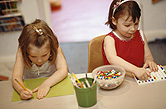
FRIDAY, June 11 (HealthDay News) — Highly confident teachers and emotional support in the classroom play important roles in helping preschoolers learn language and literacy skills, a new study has found.
The researchers focused on 67 preschool teachers and 328 of their students over a 30-week period. The teachers completed a questionnaire designed to measure their level of confidence in their teaching ability, which the study authors deemed “self-efficacy.” In addition, the researchers used trained observers to measure the level of classroom emotional support for students.
Language and literacy skills tests were given to the children at the beginning and end of the 30 weeks. Students whose teachers had high self-efficacy showed gains in a measure of an early literacy skill called print awareness, such as being able to identify a single letter on a page.
However, advances in vocabulary knowledge skills occurred only among children in classrooms that offered emotional support as well as a teacher with high self-efficacy.
“Emotionally responsive relationships between teachers and children may be the way by which the self-efficacy of teachers can have a positive influence on children’s literacy,” study co-author Ying Guo, a postdoctoral researcher in education at Ohio State University, said in a university news release.
Certification level and years of experience were among the factors that affected teachers’ self-efficacy. For example, teachers with elementary certification had higher levels of self-efficacy than those with preschool certification.
The study was published recently in the journal Teaching and Teacher Education.
More information
The U.S. National Institute on Deafness and Other Communication Disorders outlines speech and language development.

